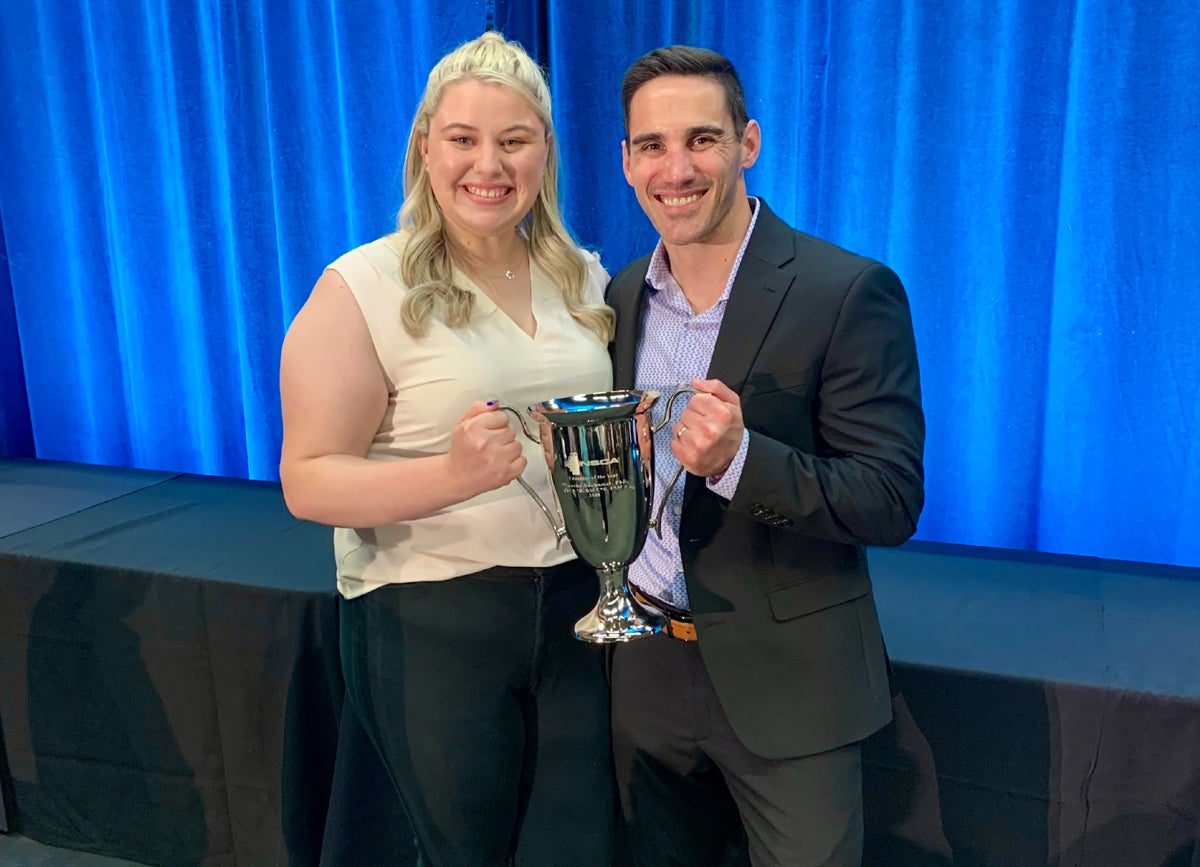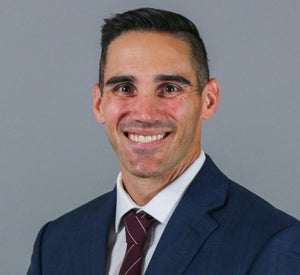The one-year Master of Sports Science program at Pitt offers students a variety of immersive internship experiences, from research-based to working alongside Division I and Division III sports teams. Recent graduate Desiree George (MS ‘25) not only gained confidence and experience being a sports and conditioning coach, but also in presenting research, which earned her the top award at the National Strength and Conditioning Association (NSCA) National Conference in July. Learn more about George and her time at Pitt!
Choosing Pitt for Sports Science
Ever since I started my bachelor’s degree, I knew I wanted to be in the field of strength and conditioning, as well as sport science. I have dedicated so much of my time completing internships and speaking to professors so I could learn as much as I can in this field.
I knew that for graduate school, I wanted an in-person program with hands-on learning opportunities. While I looked at other programs, I looked specifically at the courses being offered in the Pitt Sports Science program and ultimately chose Pitt because of the strong curriculum. I visited campus and met so many people in the program who answered my questions.
They made me feel like I could succeed at Pitt and helped me see what my future might be.
The Sports Science Experience
I have nothing but good things to say about my experience. The professors are extremely knowledgeable about their topics and willing to help in every way possible. They give you opportunities to grow by making you think critically, as well as teaching us how to use various forms of testing and technology in both the research and practical setting.
Pitt’s Sports Science program taught me to trust myself and believe in my abilities. It sounds cheesy, but at the start of the program I was nervous since I was coming from a small private college in Elizabethtown, Pennsylvania, to a city I knew nothing about.
However, as I progressed, I gained confidence—whether it was from my experience coaching teams at Carnegie Mellon University (CMU), a NCAA Division III school for athletics, or submitting and getting my research accepted by the NSCA—these were opportunities that I would have never done, or thought to have done, before Pitt.
Internship Experience
My internship with CMU allowed me to apply what I was learning in a practical setting and grow as a strength and conditioning coach. The sports science classes were geared towards areas I was interested in, specifically learning about approaches to coaching and learning how to coach in my own way. Since this was an area I needed to improve on, the CMU internship allowed me that opportunity.
I was able to build upon what I previously learned about in performance testing from the different classes, whether it was administering tests, data interpretation or presenting results. What I learned in the Sports Science classes helped when I was completing performance testing in my internship. I learned to think about why we did the testing and the purpose behind the testing. They also gave me hands-on opportunities I didn’t have as an undergraduate.

I really enjoyed working directly with the 13 different athletic teams at CMU, leading them through the lifts and workouts. I was able to learn different coaching styles and how programming differs depending on the sport and the athletes’ specific position. It was a really unique opportunity to see where some sports overlap and how they differ in their training, and I could see it firsthand in a session rather than reading about it in a book.
Research and the NSCA National Conference
I got to work directly with Program Director and Associate Professor Tim Suchomel, and it was an experience unlike any other. He was my direct advisor through the program and oversaw my capstone project. While teaching was his main goal, he still made time to check in to see how everyone was doing and help wherever he could.
From the start he talked about the opportunity to submit our capstone research to present at the NSCA National Conference. While my original capstone project could not be submitted, Dr. Suchomel worked with me, and we found other research for me to do so I didn’t miss the opportunity to submit. We would meet regularly to ensure that I understood what we were doing since deadlines were tight!
My research presentation was titled, “The Differences Between Linear Position Transducer Estimated and Actual One-Repetition Maximum Back Squat.” Essentially, we used two different devices to measure barbell velocity at different weights during a back squat warm-up protocol based on what participants believed was the maximum weight they could lift. From there we took the mean and peak barbell velocities and estimated the maximum amount of weight the individual could lift. After the warm-up, the participants completed maximum back squat attempts to determine their true maximum weight. From there, we compared the estimated and true values which showed that the estimated values either under- or over-estimated the participant’s maximum weight.
We found that the use of these devices to estimate one-repetition maximums has the potential for large under- or over-estimations compared to an individual’s actual maximum. So, the use of these systems for estimating one-repetition maximums for athletes would be questioned due to issues with accurate load assessment and prescription as well as the inability to accurately track the maximal strength progressions and regressions.
As soon as I got the notification that my abstract was accepted for the NSCA conference, I got a message from Dr. Suchomel congratulating me. From there he guided me on building the presentation and meeting both in-person and virtually to practice giving the presentation as well as answering questions all the way up to the conference in July.
The top five master’s degree students who presented during the conference had the opportunity to be awarded the NSCA Master’s Student Outstanding Podium Presentation. When Dr. Suchomel was notified about me winning this award, I was so excited that I started crying.
Looking back at it now, if it wasn’t for Dr. Suchomel I would never have thought about submitting research and I wouldn’t have known what an amazing opportunity it was to present at the NSCA National Conference.
Looking at my career, winning this award means that I’m starting to establish myself professionally and that while I’m still learning, people are able to learn something from me as well. This award also makes me excited for the future because it was something I never considered before Pitt. As I go into this next stage of my career, it makes me more open to similar opportunities as well.
Life After Graduation
I’ve spent the last year at CMU learning and trying to become a better coach. After completing my internship there in the summer, I was offered the opportunity to come and work as the assistant swim strength and conditioning coach.
When I complete all my responsibilities for the swim and dive team, I will assist with other CMU sports teams as well that are passing through the weight room. The main thing I do with these teams is both pre- and post-performance testing as well as weekly force plate monitoring.
I’m looking forward to continuing to work with CMU since I already know many of the athletes and coaches, but I’m also looking forward to starting something new. I didn’t work with the swim team during my internship, so I get to meet a whole new group of athletes and grow as a professional!


